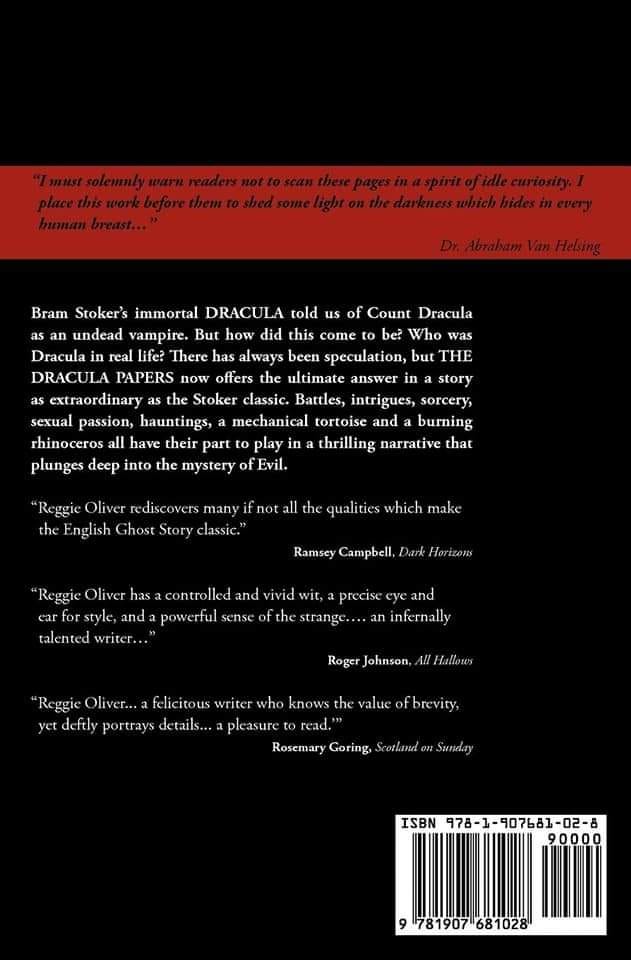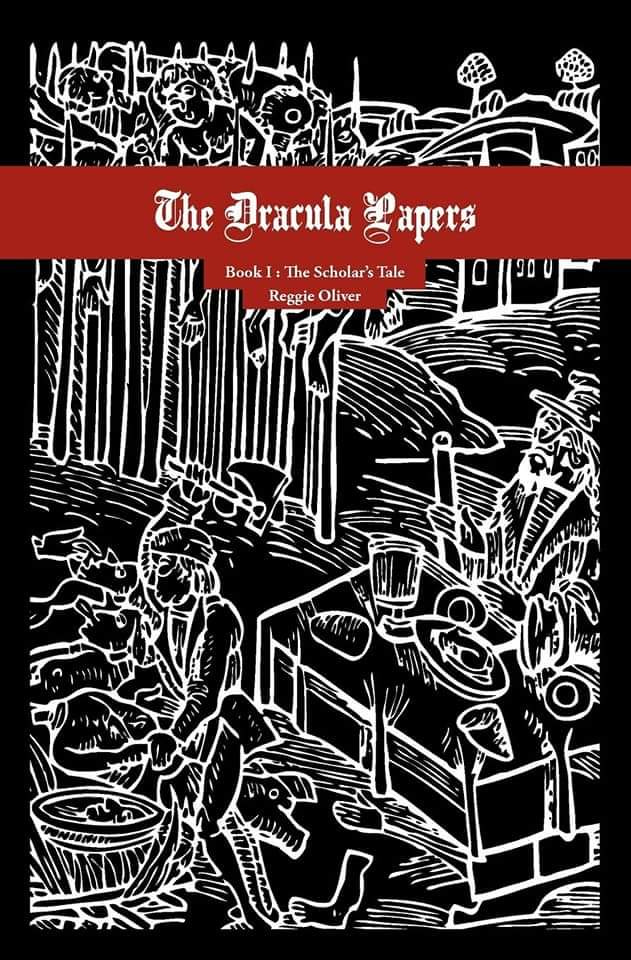"Thus we had released Barabbas and crucified an innocent man"
The Dracula Papers 1: The Scholar's Tale (2011) by Reggie Oliver
The Dracula Papers 1: The Scholar's Tale by Reggie Oliver (2011) is a rip-snorting, swashbuckling adventure set in the 17th century. It is worthy of comparison to The Prisoner in the Mask by Dennis Wheatley, if not Sabatini's Captain Blood.
Martin Bellorius (1553-1635), known as Bellorius Polymathus, Doctor at the University of Wittenberg, is hired as tutor to the sons of His most Serene Potency, Xantho, third of that name, King of Transylvania, Lord of the Carpathian Hills, Prince of Wallachia, and the Plains of Gorg and Saranth to the River An. Bellorius, his secretary Verney, and Razendoringer the dwarf, a capable and daring servant, are captured and held for ransom by Carpathian bandit queen Armida and her men.
After Bellorius and his comrades are rescued by Xantho's soldiers, they await Armida's execution by impalement.
A great scaffold was set up in the town square for the execution of Armida and round it, on sharpened wooden stakes, were placed the heads of her thirty or so followers. In the middle of the scaffold was set another stake, longer and thinner than the others, and sharpened to a grim point.
Then I learnt that it was the custom of these people to impale their condemned and leave them there to die. I had seen men and women burned, hanged and decapitated — in the case of one witch I saw at Augsburg, all three — but this seemed to be the cruellest of ends and too near in manner to the crucifixion of Our Saviour to lie easy on the conscience of a Christian. And all this for a woman. Yet, coward that I was, I had no stomach to appeal for clemency.
Perhaps I knew that such an appeal would be useless. We had been lodged at the local inn and I, at least, spent the greater part of the day in sleeping, eating and recovering my strength. Towards evening Razendoringer came to me and said: “We are going to visit the prisoner.”
“Armida? Why?”
“To rescue her.”
“Are you mad?”
“She promised that we would be set free even if Xantho paid no ransom.”
“Then why did you help to organise our escape?”
“I did not trust her.”
“But if you did not trust her...”
“The fact that I did not trust her does not mean that she was in fact untrustworthy.”
“This is sheer sophistry. What you mean is that she promised to save you but not Verney or myself.” Razendoringer hung his head. “Do not be ashamed. It was all the more noble of you to assist in our escape.”
The dwarf looked at me. “But the death she will suffer tomorrow is too terrible to contemplate.”
“Yes. I have been thinking about it. But what can one do?”
“You must ask to see the prisoner and, when I give the signal, engage the gaoler in earnest conversation.”
It proved easier to get to see Armida than I feared. I was King Xantho’s man now, and I wished to gloat over my former captor. This was perfectly understood.
We found Armida languishing in the narrowest and most verminous cell of the whole keep. The air was musty and damp and the captive was shivering as much from cold as from fear. Pity had now overridden every other kind of emotion in me, but, as instructed by Razendoringer, I assailed her with a storm of taunts and insults. I then gave a long and vivid account of my captivity to the gaoler, somewhat exaggerating the bestiality of the circumstances under which we lived. As I talked, Razendoringer, with the deftness of a skilled sneak-thief, took impressions in wax of all the keys at the gaoler’s belt. I also saw him pour something into the stone jar of ale that stood on the gaoler’s table. After heaping a final tirade of abuse on an astonished Armida we left.
How Razendoringer had metal copies of the keys made, how he found the windows of Armida’s cell at whose bars he had indicated she should tie a handkerchief, how he shot the keys through that window attached to a crossbow bolt, all these are worthy of a tale; but suffice it to say he did all these things, whereupon the brigand chieftainess made good her escape.
I was very fearful the next day in case suspicion should fall upon us for what had happened. Indeed neither of us knew whether she had got away, so Razendoringer and I were in despair when we heard that the execution was to take place as arranged.
Crowds gathered in the main square as, at noon, the prisoner was led forth, head bandaged and bloody so that the features were obscured.
Razendoringer tugged at my sleeve. The prisoner was not a woman but a man. We could see hair on the wrists. He seemed too dazed and weak to cry out until the dreadful work of execution was under way, and then his terrible screams were mercifully drowned in the roar of the crowd.
Razendoringer and I turned away from the scene, pale and cold. The man who had gone to the stake was the gaoler. Ragul, as we later discovered, had suspected him of taking bribes to release Armida and, not wishing to lose face with the king or the people of Boltenia, he had sacrificed the gaoler in her stead. Thus we had released Barabbas and crucified an innocent man. Which shows the maxim of Appollonius to be true: that in a savage world no good deed goes unpunished….





